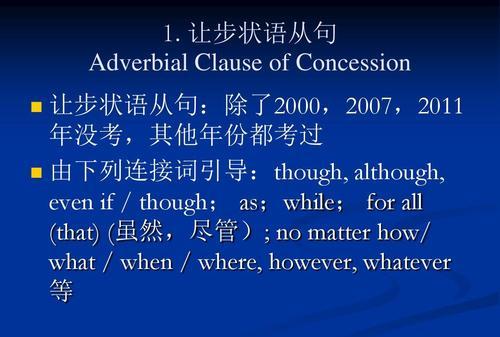英语中的让步状语从句使用多种连词,包括"Although/Though"、“Even though”、“Despite/In spite of”和"While/Whereas"。这些连词都表达“尽管”的意思,但使用和强调程度有所不同。

1. Although/Though
"Although"和"though"是让步状语从句中最常用的连词,它们的意思都是“尽管”。例如:
-
Although it was raining, I still went for a walk. 尽管下雨,我仍然去散步了。
-
Though she was tired, she continued to work. 尽管她很累,她还是继续工作了。
2. Even though
"Even though"的意思也是“尽管”,加上了一个“even”表示强调。例如:
- Even though he had plenty of money, he still chose to live frugally. 尽管他有很多钱,他还是选择过简朴的生活。
3. Despite/In spite of
"Despite"和"In spite of"都是表示“尽管”的意思,但它们的结构略有不同。"Despite"后面接名词或代词,"In spite of"后面接名词、代词或动词-ing形式。例如:
-
Despite the bad weather, they went on a picnic. 尽管天气很糟,他们还是去野餐了。
-
In spite of feeling tired, she decided to go to the gym. 尽管感到累了,她还是决定去健身房。
-
In spite of working hard, he failed the exam. 尽管努力学习,他还是考试不及格了。
4. While/Whereas
"While"和"whereas"都是表示对比的连词,也可以用来引导让步状语从句。例如:
-
While I appreciate your help, I still need to do this on my own. 尽管我感激你的帮助,但我还是要自己完成这件事。
-
Whereas he prefers tea, she likes to drink coffee. 尽管他喜欢喝茶,但她却喜欢喝咖啡。
